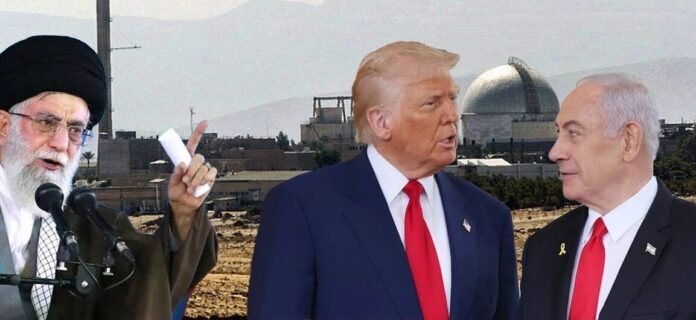In a tense 40-minute call, Donald Trump and Benjamin Netanyahu discussed looming nuclear talks with Iran, rising regional instability, and political crisis in Israel, with both leaders under pressure to prevent a deadly escalation
President Donald Trump and Israeli Prime Minister Benjamin Netanyahu spoke for 40 minutes on Monday night, as the United States and Iran edged closer to a potential nuclear agreement. Trump, who called the talks a last chance to avoid “destruction and death,” warned that Iran’s demands may still derail the deal.
The call came shortly after Tehran confirmed it would issue a response to Washington’s latest nuclear proposal within days. Trump told reporters that his conversation with Netanyahu “went very well,” adding that another round of talks with Iran was scheduled for Thursday, followed by indirect negotiations in Muscat on Sunday.
While the Prime Minister’s Office gave a sparse readout, confirming only that the pair discussed nuclear negotiations, Hebrew media reported that Netanyahu ended his corruption trial testimony early to prioritise the call. Within hours, he convened a high-level security briefing attended by senior ministers including Defence Minister Israel Katz and Strategic Affairs Minister Ron Dermer.
Netanyahu also instructed Dermer and Mossad chief David Barnea to meet with US special envoy Steve Witkoff ahead of the upcoming negotiations. The urgency reflects what the Israeli leader reportedly described to ultra-Orthodox coalition partners as a “dramatic period” in Israeli politics and security.
Meanwhile, Trump offered rare candour about Iran’s demands, revealing that Tehran refuses to abandon uranium enrichment capabilities. “They don’t want to give up what they have to give up,” he said. “They seek enrichment, and that’s something I won’t permit.” While previous US proposals allowed limited low-level enrichment, Trump appeared to draw a new red line. “If they enrich, then we’ll have to do it the other way,” he warned, implying potential military action.
Iran’s foreign ministry confirmed that its counter-offer is being finalised, and a senior spokesperson noted the upcoming talks with Washington in Muscat, as reported by Reuters.
The stakes of the nuclear negotiations are rising alongside political turmoil in both countries. In Israel, Netanyahu is juggling regional instability with deep internal divisions. His fragile coalition is under threat from ultra-Orthodox parties demanding the passage of a controversial draft exemption bill, which would prevent mandatory military service for Haredi Jews. Failure to deliver could trigger the government’s collapse.
US Ambassador Mike Huckabee has reportedly met with Haredi lawmakers to try and defuse the crisis, emphasising that “government stability is important for addressing the Iranian issue.” While Huckabee’s office declined to confirm the nature of these talks, Netanyahu’s inner circle is reportedly aware of the outreach.
On the regional front, the backdrop remains tense. Hamas has yet to respond to a proposed Gaza ceasefire and hostage deal brokered by the US and Egypt. Trump hinted that Iran may be involved in these discussions as well, though he offered no details. “We want to get the hostages back,” he told reporters. “We’ll see what’s going to happen with Gaza.”
The alignment of nuclear diplomacy, coalition fragility, and a potential war with Iran presents Netanyahu with what he reportedly called a “historic window of opportunity that will not return.” Opposition leaders, aware of his framing, have accused the Prime Minister of using national security as leverage to consolidate power amid his legal troubles.
Despite the ambiguity surrounding the exact terms of the proposed Iran deal, Trump’s tone suggested urgency and fatigue. “They are tough negotiators,” he admitted, before reiterating that a peaceful resolution remained the preferred path. “We’re trying to make a deal so that there’s no destruction and death.”
As diplomatic pressure mounts on all sides, the world waits to see whether this new round of talks will yield a breakthrough—or push the region further toward confrontation.
